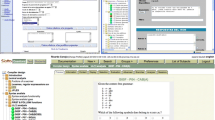Abstract
The problem of comparing and matching different learners’ knowledge arises when assessment systems use a one-dimensional numerical value to represent “knowledge level”. Such assessment systems may measure inconsistently because they estimate this level differently and inadequately. The multi-dimensional competency model called COMpetence-Based learner knowledge for personalized Assessment (COMBA) is being developed to represent a learner’s knowledge in a multi-dimensional vector space. The heart of this model is to treat knowledge, not as possession, but as a contextualized space of capability either actual or potential. The paper discusses a system for automatically generating questions from the COMBA competency model as a “guide-on-the–side”. The system’s novel design and implementation involves an ontological database that represents the intended learning outcome to be assessed across a number of dimensions, including level of cognitive ability and subject matter. The system generates all the questions that are possible from a given learning outcome, which may then be used to test for understanding, and so could determine the degree to which learners actually acquire the desired knowledge.
Access this chapter
Tax calculation will be finalised at checkout
Purchases are for personal use only
Preview
Unable to display preview. Download preview PDF.
Similar content being viewed by others
References
Koper, R., Specht, M.: TenCompetence: Lifelong Competence Development and Learning. In: Sicilia, M.-A. (ed.) Competencies in Organizational E-Learning: Concepts and Tools. Idea Group (2007)
Shepard, L.A.: The Role of Assessment in a Learning Culture. Journal Information for Educational Researcher 29(7), 4–14 (2000)
Sitthisak, O., Gilbert, L., Davis, H.C.: Towards a competency model for adaptive assessment to support lifelong learning. In: TENCompetence Workshop on Service Oriented Approaches and Lifelong Competence Development Infrastructures, Manchester, UK (2007)
Way, W.D.: Practical Questions in Introducing Computerized Adaptive Testing for K-12 Assessments (2005)
Aroyo, L., Dolog, P., Houben, G.J., Kravcik, M., Nilsson, A.N.a.M., Wild, F.: Interoperability in Personalized Adaptive Learning. Education Technology and Society 9(2), 8–14 (2006)
Sitthisak, O., Gilbert, L., Davis, H.C., Gobbi, M.: Adapting health care competencies to a formal competency model. In: The ICALT. IEEE Computer Society Press, Niigata (2007)
UK Royal College of Nursing, Competencies, http://www.rcn.org.uk/development/communities/specialisms/children_and_young_people/resources/a-z_of_resources/competencies
Ramritu, P.L., Barnard, A.: New nurse graduates’ understanding of competence. International nursing review (2001)
Defloor, T., Hecke, A.V., Verhaeghe, S., Gobert, M., Darras, E., Grypdonck, M.: The clinical nursing competences and their complexity in Belgian general hospitals. Journal of Advanced Nursing 56(6), 669–678 (2006)
Bloom, B.S., Krathwohl, D.R.: Taxonomy of educational objectives: The classification of educational goals by a committee of college and university examiners. In: Domain, H.I.C. (ed.). Longman, New York (1956)
Merrill, M.D.: Component Display Theory, http://coe.sdsu.edu/eet/articles/cdt/index.htm
Krathwohl, D.R., Anderson, L.: A revision of bloom’s taxonomy: An overview. Theory into Practice 41(4), 212–218 (2002)
Kunzmann, C.: Ontology-based Competence Management for Healthcare Training Planning: A Case Study. In: Proceeding of the International Conference on Knowledge Management, Austria (2006)
W3C, SKOS Core Guide, http://www.w3.org/TR/swbp-skos-core-guide/
Johnson, B., Shneiderman, B.: Tree-Maps: a space-filling approach to the visualization of hierarchical information structures. In: Proceedings of the 2nd conference on Visualization 1991, San Diego, California. IEEE Computer Society Press, Los Alamitos (1991)
McMillan, J.H.: Classroom Assessment: Principles and Practice for Effective Instruction, 4th edn. Pearson Technology Group, London (2006)
Rolfe, I., MaPherson, J.: Formative assessment: how am I doing? Lacent 345(8953), 837–839 (1995)
Sewell, J.: Diagnostic assessment within the Skills for Life strategy. In: 30th IAEA Conference, Philadelphia (2004)
Brown, S.: Using Formative Assessment to promote student learning, http://www.ldu.leeds.ac.uk/news/events/documents/BrownPowerPoint.pdf
Nursing and Midwifery Council, http://www.nmc-uk.org/aFrameDisplay.aspx?DocumentID=171
Brusilovsky, P.: Adaptive Educational hypermedia, pp. 8–12 (2001)
Falmagne, J.-C., Cosyn, E., Doignon, J.-P., Thiery, N.: The Assessment of Knowledge, in Theory and in Practice. In: Integration of Knowledge Intensive Multi-Agent Systems (2003)
Antoniou, G., van Harmelen, F.: A Semantic Web Primer. The MIT Press, Cambridge (2004)
IMS QTI, IMS Question and Test Interoperability Overview, http://www.imsglobal.org/question/qtiv2p1pd2/imsqti_oviewv2p1pd2.html
Kalfoglou, Y.: Exploring Ontologies. In: Handbook of Software Engineering and Knowledge Engineering. Fundamentals, vol. 1. World Scientific Publishing, Washington (2001)
Jovanovic, J., Gasevic, D., Devedzic, V.: Ontology-Based Automatic Annotation of Learning Content. Semantic Web and Information Systems 2(2), 91–119 (2006)
W3C, Resource Description Framework (RDF), http://www.w3.org/RDF/
W3C, OWL Web Ontology Language (OWL), http://www.w3.org/TR/owl-ref/
Author information
Authors and Affiliations
Editor information
Editors and Affiliations
Rights and permissions
Copyright information
© 2009 Springer-Verlag Berlin Heidelberg
About this paper
Cite this paper
Sitthisak, O., Gilbert, L., Davis, H.C. (2009). Transforming a Competency Model to Parameterised Questions in Assessment. In: Cordeiro, J., Hammoudi, S., Filipe, J. (eds) Web Information Systems and Technologies. WEBIST 2008. Lecture Notes in Business Information Processing, vol 18. Springer, Berlin, Heidelberg. https://doi.org/10.1007/978-3-642-01344-7_29
Download citation
DOI: https://doi.org/10.1007/978-3-642-01344-7_29
Publisher Name: Springer, Berlin, Heidelberg
Print ISBN: 978-3-642-01343-0
Online ISBN: 978-3-642-01344-7
eBook Packages: Computer ScienceComputer Science (R0)




